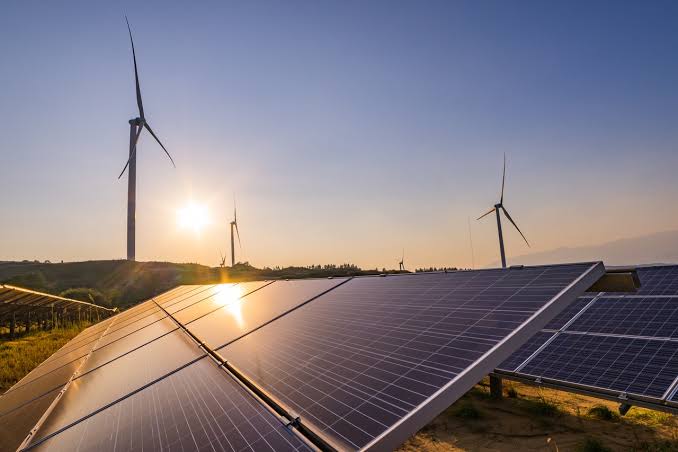BY DARE AKOGUN
The upcoming Berlin Energy Transition Dialogue 2024, BETD.24, summit to be held during the Berlin Energy Week in the German capital presents a pivotal moment for Nigeria to underline its status as a critical stakeholder, as world leaders gather to discuss the transition from fossil fuels to renewable energy.
Against the backdrop of escalating climate concerns, looking at this years theme “Accelerating The Global Energy Transition”, Nigeria stands at the forefront of shaping the global energy landscape with its ambitious plans towards energy transition agenda.
According to the EU Climate Change Service (Copernicus), 2023 was the warmest year since records began in 1850 – with a global average temperature that was 1.48° Celsius higher than the average of the years 1850 to 1900.
Advertisement
At the heart of Nigeria’s commitment is the pledge made by President Muhammadu Buhari at the COP26 conference in Glasgow, signaling Nigeria’s intent to achieve net-zero emissions by 2060.
This landmark declaration set the stage for the then Vice President, Professor Yemi Osinbajo, to unveil Nigeria’s Energy Transition Plan (ETP) on August 24, 2022, outlining the country’s strategy towards a net-zero emissions energy system.
A significant milestone in Nigeria’s energy transition journey is the recent revelation of a comprehensive blueprint for a $2.5 billion carbon market.
Advertisement
Vice President Kashim Shettima, during the inauguration of the Inter-governmental Committee on Carbon Market Activation Plan, on Thursday March 7, 2024 in Abuja emphasized the strategic importance of leveraging natural gas as a transitional fuel while shaping a national carbon market strategy.
Chaired by Dr. Zacch Adedeji, the committee’s formation aligns with President Bola Ahmed Tinubu’s vision announced at the COP 28 in Dubai last year to minimize Nigeria’s carbon emissions, and taps into the Africa Carbon Market Initiative, positioning Nigeria as a key player in the lucrative carbon market.
Despite commendable efforts outlined in the ETP, Nigeria faces challenges in translating its ambitious goals into actionable strategies.
Analyses by experts suggest, Nigeria might have a difficult time realizing the key
objectives of the ETP for the same reasons, this policy like others before it, failed to prioritise economic development coupled with poor planning, and weak institutional and Fiscal frameworks.
Advertisement
Past initiatives, such as the Nigerian Renewable Energy Master Plan, have fallen short of expectations due to inadequate economic prioritization and institutional frameworks.
How can Nigeria’s ETP avoid similar setbacks? Because decarbonization
strategies are often far too expensive, and detached from the day-to-day reality of low-income populations, Nigeria’s capacity to reach net zero is contingent upon raising its population out of poverty, first and foremost.
With this lens, a critical analysis of the Nigerian ETP reveals additional and complementary actions that could be taken to realize a net-zero emissions
energy system.
To address these setbacks, complementary actions are essential. Nigeria must identify, and support low-carbon energy solutions tailored towards the needs of low-income populations, innovate in natural gas infrastructure development, and modernize biomass utilization practices.
Advertisement
The ETP envisages the adoption of clean technologies, such as electric vehicles and stoves, irrespective of income strata.
However, over 40% of Nigerians live below the poverty line. Poor people tend to buy items with the least upfront cost, regardless of their carbon footprints.
Advertisement
For example, research has shown income to be the determining factor for the adoption of clean cooking facilities.
Given thesignificant population living in poverty today, research on low-carbon energy solutions for low-income households is needed, especially in the rural and peri-urban areas of Nigeria, to identify appropriate and affordable low-cost technologies.
Advertisement
Nigeria’s ETP sees the role of natural gas as a transition fuel on its journey to a net-zero economy.
However, natural gas needs time, and infrastructure lifetime mean it can take decades to change energy
systems, potentially risking carbon lock-in.
Advertisement
Nigeria should therefore invest in
developing dual-use infrastructure, for example, pipelines and distribution that can also be used for green hydrogen or synthetic fuels.
Additionally, improving energy efficiency in small and medium enterprises (SMEs) and exploring natural carbon removal solutions are critical steps towards realizing Nigeria’s ETP objectives.
The ETP is silent on the role of energy efficiency in driving a net-zero emissions energy system.
Energy efficiency is an essential tool in reducing carbon emissions in Nigeria because it will reduce power demand, and subsequently, the amount of fossil fuel that would have been burnt by the conventional gas power plants.
SMEs account for 70% of Nigeria’s industrial employment and about 50% of manufacturing output. Given the role of
SMEs in Nigeria’s industrial sector, large-scale adoption of energy-efficient technologies (e.g., advanced electric motors, fans, boilers, etc.) will be required to accelerate the transition to net zero by 2060 by reducing total power requirements in the sector.
Nigeria must also reduce dependency on foreign climate finance and harmonize climate-related policies to ensure effective implementation of the ETP.
It is estimated that Nigeria will need $410bn to deliver the ETP. Over the years, Nigeria has depended on external funds to finance its energy/climate plans which has resulted in delays in project implementation due to uncertainties in donor funding.
This over-reliance on external financing will limit Nigeria’s ability to implement its ETP.
Experience over the years has also shown that Nigeria’s energy challenges cannot be addressed without substantial doses of domestic financing.
Nigeria must look inwards to mobilize all the financial resources for its ETP
before seeking external funding.
With Nigeria’s capacity to fight climate change closely linked to its economic development, breaking the cycle of poverty and fostering innovation in new energy infrastructure are imperative.
Nigeria’s journey towards a sustainable energy future requires concerted efforts from government, citizens, and other critical stakeholders alike.
As Nigeria navigates the complex terrain of energy transition, the spotlight remains on its ability to translate ambitious plans into tangible actions that pave the way for a greener, more resilient energy future.
Dare Akogun is an Ilorin-based journalist. He can be reached via [email protected]
Views expressed by contributors are strictly personal and not of TheCable.
Add a comment






